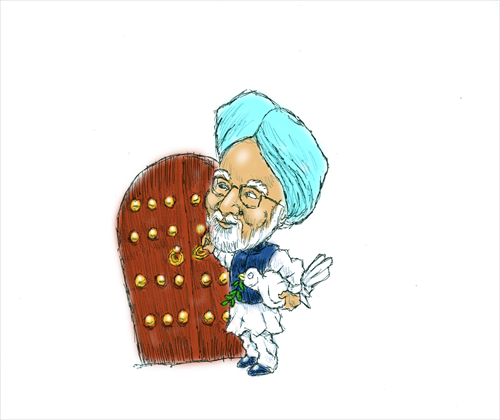Mutual needs pave way for Singh’s China visit

Illustrations: Peter C. Espina/GT
Indian Prime Minister Manmohan Singh is currently paying a visit to China. On the eve of Singh's visit, mainstream media in India has restrained nationalist calls for hard line over a series of issues of potential conflict, in an attempt to create a favorable atmosphere for a fruitful visit.
Compared with the tone on borderland reports in past months, there has been a sharp turn of Indian media focus, which to some extent still reflects the distrust between the two sides.
A popular explanation for such distrust is that India sees China as a security threat. In 1998, India stunned international society by five nuclear tests, announcing itself a de facto nuclear state. India has also impressed the international community by successive huge arms deals, which are believed to target China and counter against China's increasing power.
However, the "China threat" argument cannot explain why India would wait for 24 years after its first nuclear test in 1974. China has also made it clear that it is willing to settle for the status quo of shelving disputes on territorial issues at present.
Sino-Indian disputes cannot reflect the true colors of Sino-Indian strategic interaction on the international stage.
In fact, in the early 1990s, India made the move to improve its relations with Pakistan and China by signing confidence-building agreements.
Unlike Sino-Japanese disputes over the Diaoyu Islands in which Japan is determined to escalate the situation, Sino-Indian border issues have generally been peaceful and stable since the first round of border talks in 2003, which did not solve the whole issue but showed a mutual willingness to talk.
Some might quote stagnating bilateral economic ties for gloomy future relations, but economic ties are never the determining factor on bilateral political relations.
Japan and China have strong economic ties, but these cannot prevent their political distrust and worsening relations.
Compared with Russia and China's quasi-ally relationship on many issues, their trade ties are unsatisfactory to both sides.
We should take a deep look into the strategic consideration involved in bilateral cooperation. Both China and India are aiming for great power status in an era where the center of global affairs is shifting to Asia, and neither side can afford having a powerful enemy at door side.
For China, its international ambition as a great power requires it to deploy more resources in East Asia. An enemy on the west gate as powerful as India would jeopardize its ambitions.
As for India, a potential big player in international politics, it is in its interests to keep a subtle balance in its relations with big powers.
In triangular relations with China-US-India or China-Russia-India, India can act as a balancing force, and its choice of flexibility will break the balance and ensure its interests.
As noted in Chinese President Xi Jinping's remarks with Singh this March, China and India should respect each other's core interests and major concerns, deepen mutual strategic trust, and hence strengthen coordination and cooperation on international affairs.
Singh gave a very positive response by making it clear that India adheres to an independent foreign policy and will not be used as a tool to contain China.
As noted in Nonalignment 2.0, a strategic framework for India foreign policy published in 2012, the core objective of India's strategic approach should be to give India maximum options in its relations with the outside world, hence enhancing India's strategic space and capacity for independent development.
If this is so, China should welcome and encourage an India pursuing strategic autonomy.
Strategic needs can alleviate mutual political distrust and pave the way for an improving relationship.
The author is a visiting doctoral student at the Department of Politics and International Relations, University of Oxford. opinion@globaltimes.com.cn